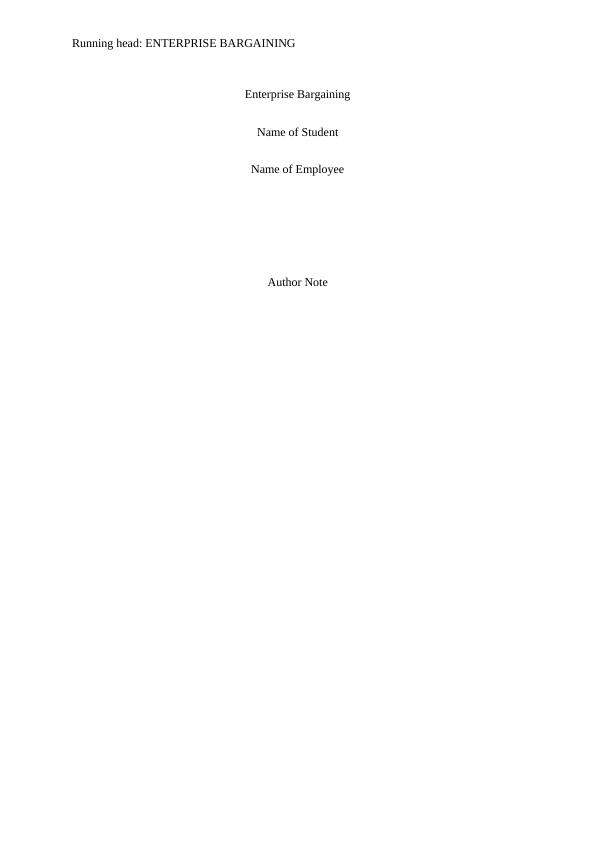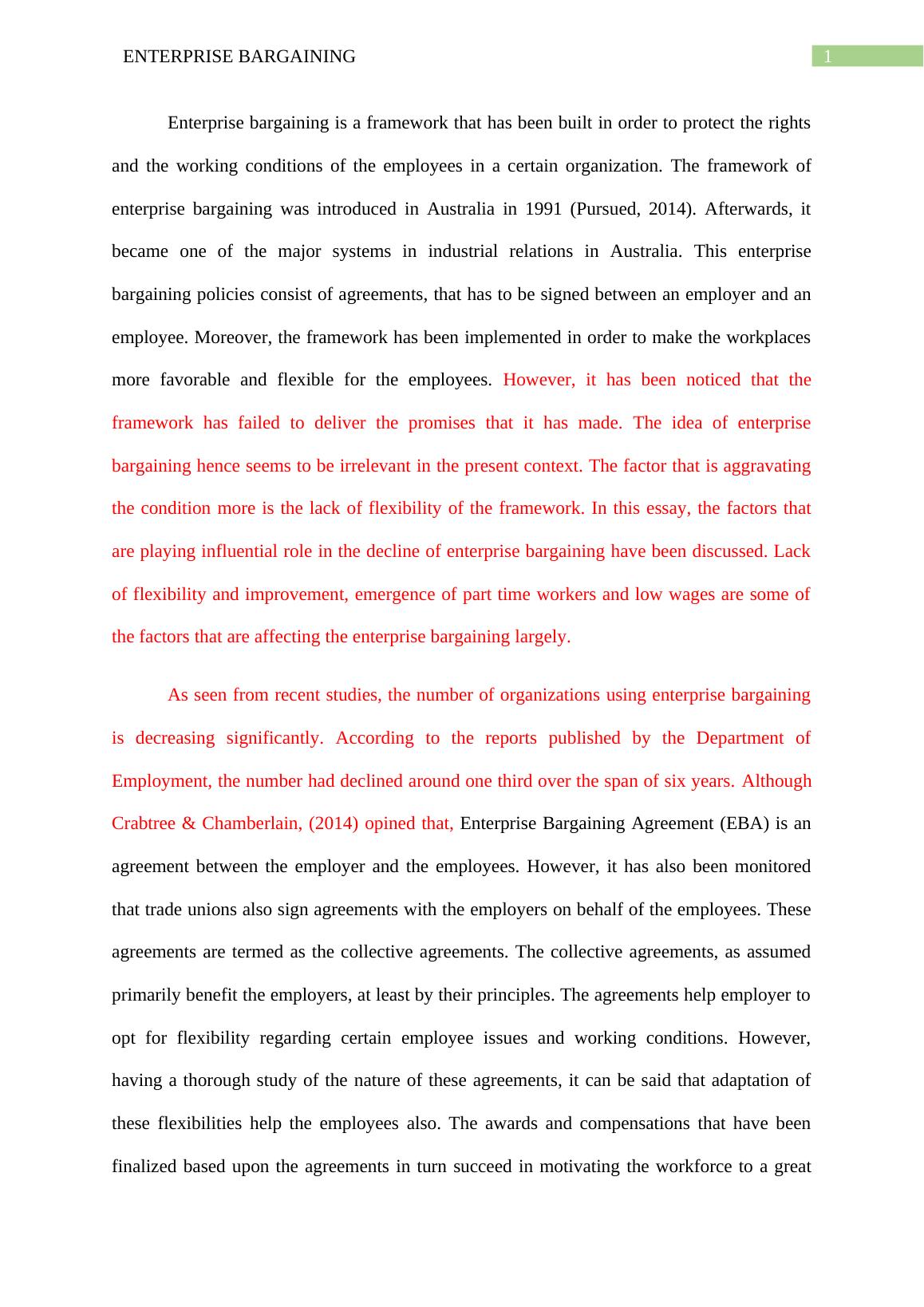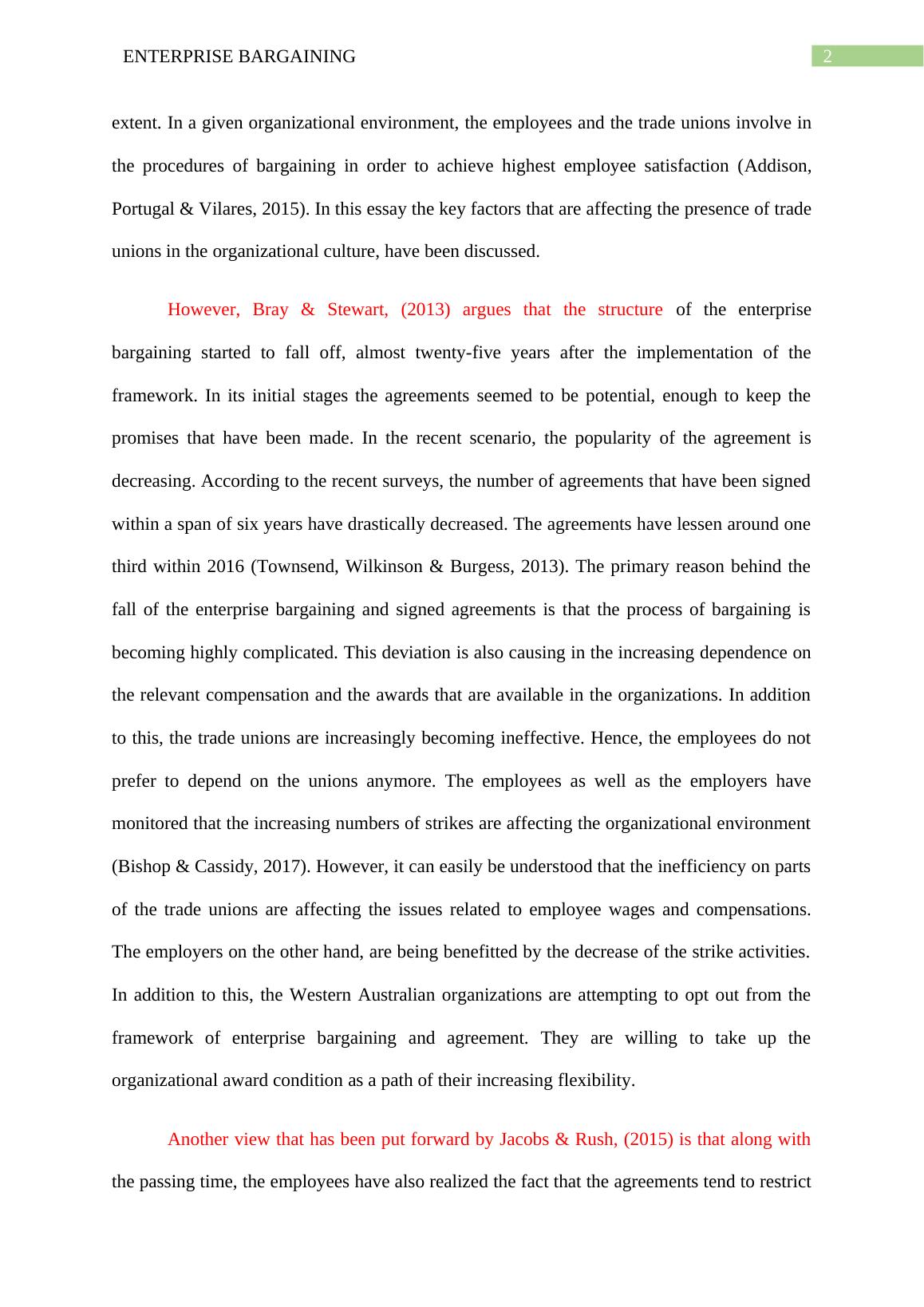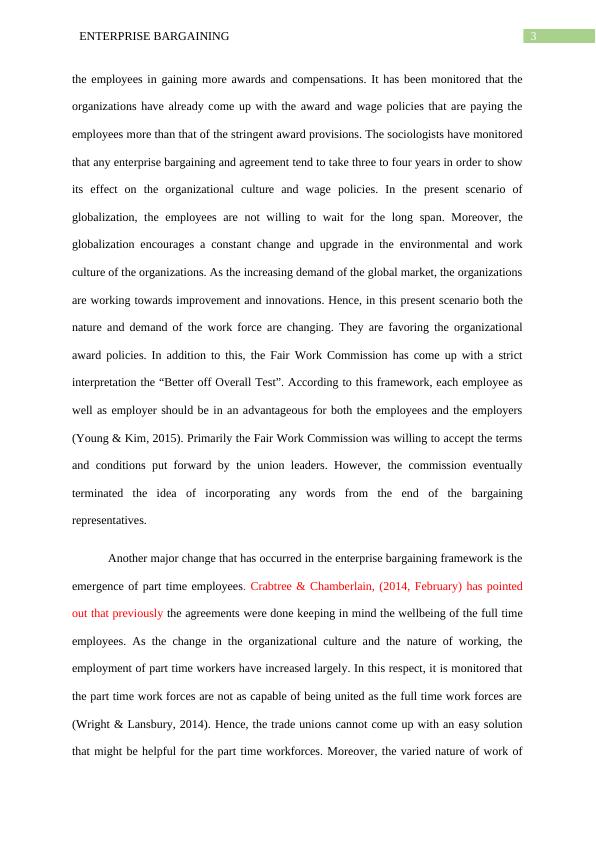Factors Affecting the Decline of Enterprise Bargaining in Australia
Added on 2023-06-07
11 Pages3132 Words493 Views
Running head: ENTERPRISE BARGAINING
Enterprise Bargaining
Name of Student
Name of Employee
Author Note
Enterprise Bargaining
Name of Student
Name of Employee
Author Note

1ENTERPRISE BARGAINING
Enterprise bargaining is a framework that has been built in order to protect the rights
and the working conditions of the employees in a certain organization. The framework of
enterprise bargaining was introduced in Australia in 1991 (Pursued, 2014). Afterwards, it
became one of the major systems in industrial relations in Australia. This enterprise
bargaining policies consist of agreements, that has to be signed between an employer and an
employee. Moreover, the framework has been implemented in order to make the workplaces
more favorable and flexible for the employees. However, it has been noticed that the
framework has failed to deliver the promises that it has made. The idea of enterprise
bargaining hence seems to be irrelevant in the present context. The factor that is aggravating
the condition more is the lack of flexibility of the framework. In this essay, the factors that
are playing influential role in the decline of enterprise bargaining have been discussed. Lack
of flexibility and improvement, emergence of part time workers and low wages are some of
the factors that are affecting the enterprise bargaining largely.
As seen from recent studies, the number of organizations using enterprise bargaining
is decreasing significantly. According to the reports published by the Department of
Employment, the number had declined around one third over the span of six years. Although
Crabtree & Chamberlain, (2014) opined that, Enterprise Bargaining Agreement (EBA) is an
agreement between the employer and the employees. However, it has also been monitored
that trade unions also sign agreements with the employers on behalf of the employees. These
agreements are termed as the collective agreements. The collective agreements, as assumed
primarily benefit the employers, at least by their principles. The agreements help employer to
opt for flexibility regarding certain employee issues and working conditions. However,
having a thorough study of the nature of these agreements, it can be said that adaptation of
these flexibilities help the employees also. The awards and compensations that have been
finalized based upon the agreements in turn succeed in motivating the workforce to a great
Enterprise bargaining is a framework that has been built in order to protect the rights
and the working conditions of the employees in a certain organization. The framework of
enterprise bargaining was introduced in Australia in 1991 (Pursued, 2014). Afterwards, it
became one of the major systems in industrial relations in Australia. This enterprise
bargaining policies consist of agreements, that has to be signed between an employer and an
employee. Moreover, the framework has been implemented in order to make the workplaces
more favorable and flexible for the employees. However, it has been noticed that the
framework has failed to deliver the promises that it has made. The idea of enterprise
bargaining hence seems to be irrelevant in the present context. The factor that is aggravating
the condition more is the lack of flexibility of the framework. In this essay, the factors that
are playing influential role in the decline of enterprise bargaining have been discussed. Lack
of flexibility and improvement, emergence of part time workers and low wages are some of
the factors that are affecting the enterprise bargaining largely.
As seen from recent studies, the number of organizations using enterprise bargaining
is decreasing significantly. According to the reports published by the Department of
Employment, the number had declined around one third over the span of six years. Although
Crabtree & Chamberlain, (2014) opined that, Enterprise Bargaining Agreement (EBA) is an
agreement between the employer and the employees. However, it has also been monitored
that trade unions also sign agreements with the employers on behalf of the employees. These
agreements are termed as the collective agreements. The collective agreements, as assumed
primarily benefit the employers, at least by their principles. The agreements help employer to
opt for flexibility regarding certain employee issues and working conditions. However,
having a thorough study of the nature of these agreements, it can be said that adaptation of
these flexibilities help the employees also. The awards and compensations that have been
finalized based upon the agreements in turn succeed in motivating the workforce to a great

2ENTERPRISE BARGAINING
extent. In a given organizational environment, the employees and the trade unions involve in
the procedures of bargaining in order to achieve highest employee satisfaction (Addison,
Portugal & Vilares, 2015). In this essay the key factors that are affecting the presence of trade
unions in the organizational culture, have been discussed.
However, Bray & Stewart, (2013) argues that the structure of the enterprise
bargaining started to fall off, almost twenty-five years after the implementation of the
framework. In its initial stages the agreements seemed to be potential, enough to keep the
promises that have been made. In the recent scenario, the popularity of the agreement is
decreasing. According to the recent surveys, the number of agreements that have been signed
within a span of six years have drastically decreased. The agreements have lessen around one
third within 2016 (Townsend, Wilkinson & Burgess, 2013). The primary reason behind the
fall of the enterprise bargaining and signed agreements is that the process of bargaining is
becoming highly complicated. This deviation is also causing in the increasing dependence on
the relevant compensation and the awards that are available in the organizations. In addition
to this, the trade unions are increasingly becoming ineffective. Hence, the employees do not
prefer to depend on the unions anymore. The employees as well as the employers have
monitored that the increasing numbers of strikes are affecting the organizational environment
(Bishop & Cassidy, 2017). However, it can easily be understood that the inefficiency on parts
of the trade unions are affecting the issues related to employee wages and compensations.
The employers on the other hand, are being benefitted by the decrease of the strike activities.
In addition to this, the Western Australian organizations are attempting to opt out from the
framework of enterprise bargaining and agreement. They are willing to take up the
organizational award condition as a path of their increasing flexibility.
Another view that has been put forward by Jacobs & Rush, (2015) is that along with
the passing time, the employees have also realized the fact that the agreements tend to restrict
extent. In a given organizational environment, the employees and the trade unions involve in
the procedures of bargaining in order to achieve highest employee satisfaction (Addison,
Portugal & Vilares, 2015). In this essay the key factors that are affecting the presence of trade
unions in the organizational culture, have been discussed.
However, Bray & Stewart, (2013) argues that the structure of the enterprise
bargaining started to fall off, almost twenty-five years after the implementation of the
framework. In its initial stages the agreements seemed to be potential, enough to keep the
promises that have been made. In the recent scenario, the popularity of the agreement is
decreasing. According to the recent surveys, the number of agreements that have been signed
within a span of six years have drastically decreased. The agreements have lessen around one
third within 2016 (Townsend, Wilkinson & Burgess, 2013). The primary reason behind the
fall of the enterprise bargaining and signed agreements is that the process of bargaining is
becoming highly complicated. This deviation is also causing in the increasing dependence on
the relevant compensation and the awards that are available in the organizations. In addition
to this, the trade unions are increasingly becoming ineffective. Hence, the employees do not
prefer to depend on the unions anymore. The employees as well as the employers have
monitored that the increasing numbers of strikes are affecting the organizational environment
(Bishop & Cassidy, 2017). However, it can easily be understood that the inefficiency on parts
of the trade unions are affecting the issues related to employee wages and compensations.
The employers on the other hand, are being benefitted by the decrease of the strike activities.
In addition to this, the Western Australian organizations are attempting to opt out from the
framework of enterprise bargaining and agreement. They are willing to take up the
organizational award condition as a path of their increasing flexibility.
Another view that has been put forward by Jacobs & Rush, (2015) is that along with
the passing time, the employees have also realized the fact that the agreements tend to restrict

3ENTERPRISE BARGAINING
the employees in gaining more awards and compensations. It has been monitored that the
organizations have already come up with the award and wage policies that are paying the
employees more than that of the stringent award provisions. The sociologists have monitored
that any enterprise bargaining and agreement tend to take three to four years in order to show
its effect on the organizational culture and wage policies. In the present scenario of
globalization, the employees are not willing to wait for the long span. Moreover, the
globalization encourages a constant change and upgrade in the environmental and work
culture of the organizations. As the increasing demand of the global market, the organizations
are working towards improvement and innovations. Hence, in this present scenario both the
nature and demand of the work force are changing. They are favoring the organizational
award policies. In addition to this, the Fair Work Commission has come up with a strict
interpretation the “Better off Overall Test”. According to this framework, each employee as
well as employer should be in an advantageous for both the employees and the employers
(Young & Kim, 2015). Primarily the Fair Work Commission was willing to accept the terms
and conditions put forward by the union leaders. However, the commission eventually
terminated the idea of incorporating any words from the end of the bargaining
representatives.
Another major change that has occurred in the enterprise bargaining framework is the
emergence of part time employees. Crabtree & Chamberlain, (2014, February) has pointed
out that previously the agreements were done keeping in mind the wellbeing of the full time
employees. As the change in the organizational culture and the nature of working, the
employment of part time workers have increased largely. In this respect, it is monitored that
the part time work forces are not as capable of being united as the full time work forces are
(Wright & Lansbury, 2014). Hence, the trade unions cannot come up with an easy solution
that might be helpful for the part time workforces. Moreover, the varied nature of work of
the employees in gaining more awards and compensations. It has been monitored that the
organizations have already come up with the award and wage policies that are paying the
employees more than that of the stringent award provisions. The sociologists have monitored
that any enterprise bargaining and agreement tend to take three to four years in order to show
its effect on the organizational culture and wage policies. In the present scenario of
globalization, the employees are not willing to wait for the long span. Moreover, the
globalization encourages a constant change and upgrade in the environmental and work
culture of the organizations. As the increasing demand of the global market, the organizations
are working towards improvement and innovations. Hence, in this present scenario both the
nature and demand of the work force are changing. They are favoring the organizational
award policies. In addition to this, the Fair Work Commission has come up with a strict
interpretation the “Better off Overall Test”. According to this framework, each employee as
well as employer should be in an advantageous for both the employees and the employers
(Young & Kim, 2015). Primarily the Fair Work Commission was willing to accept the terms
and conditions put forward by the union leaders. However, the commission eventually
terminated the idea of incorporating any words from the end of the bargaining
representatives.
Another major change that has occurred in the enterprise bargaining framework is the
emergence of part time employees. Crabtree & Chamberlain, (2014, February) has pointed
out that previously the agreements were done keeping in mind the wellbeing of the full time
employees. As the change in the organizational culture and the nature of working, the
employment of part time workers have increased largely. In this respect, it is monitored that
the part time work forces are not as capable of being united as the full time work forces are
(Wright & Lansbury, 2014). Hence, the trade unions cannot come up with an easy solution
that might be helpful for the part time workforces. Moreover, the varied nature of work of

End of preview
Want to access all the pages? Upload your documents or become a member.
Related Documents
Employee Relations Issues (pdf)lg...
|9
|2705
|70
Enterprise Bargaining: History, Importance and Future in Australialg...
|15
|3857
|295
Decline of Trade Union Membership in Australialg...
|8
|2114
|41
Management Trade Union Australia Discussion 2022lg...
|8
|2147
|13
Concept of Trade Union Membership | Australialg...
|12
|2737
|173
Effects of Casual Employment on Employees and the Economylg...
|9
|2448
|48
